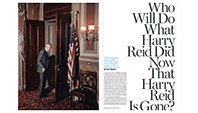 |
1. “What happens when 16 strangers on either side of America’s most contentious divide are asked to take on someone else’s story?” wrote Lisa Miller in her article on New York and Narrative 4’s experiment in radical empathy — which brought together people on both sides of the gun debate, including those who’ve lost loved ones to gun violence and those who believe guns have saved their lives (“The Gun Exchange,” December 26–January 8). The participants were paired up, and each told the other’s story in the first person. Many readers were moved by the shared experience. “Wow,” tweeted author Jeff Chu. “A difficult experiment in radical empathy with, among others, Tamir Rice’s mom and George Zimmerman’s gun dealer.” “Tremendous article — and experiment,” responded @AndrewNeel. The Pacific Standard editor Nicholas Jackson specifically highlighted the documentary New York made about the project, Guns & Empathy, and wrote on Twitter, “This is some pretty incredible work from Narrative 4 and New York Mag. Watch, listen, and read.” Some readers, though, urged others to resist the emotional draw of the story, including commenter b3nyc, who wrote, “Instead of empathy, did anyone consider facts? Like the fact that far more people are murdered by guns in this country each year than in all other First World countries combined? And we’re now so far gone that other gun groups have formed that think the NRA is too liberal?” And Clare Cecil-Karb, a licensed clinical social worker, wrote in to take exception to the project’s admittedly unscientific methodology (“The impulse is more literary than scientific,” Miller wrote). Cecil-Karb wrote, “First, the pairings were mismatched … [and] as a mental health professional, I implore you to think twice before asking traumatized people to tell their story and to hear their story retold.” However, she added, “I do commend you for telling the story of Tamir Rice’s mother’s conscientious objection.” Samaria Rice was originally slated to participate in the story exchange, along with two Baltimore police officers, but when faced with the prospect of sharing the story of her son’s death at the hands of police with the officers in the room, she decided to observe the project instead. “I am glad that she felt empowered to do that. You all can be credited for that,” wrote Cecil-Karb.
 |
2. In anticipation of Harry Reid’s retirement, Jason Zengerle profiled the outgoing Senate minority leader and raised the question: In Reid’s absence, is there anyone on the Democratic side of the aisle who will be able to effectively stand up to Republicans (“Who Will Do What Harry Reid Did Now That Harry Reid Is Gone?,” December 26–January 8)? The veteran Nevada journalist Jon Ralston thought Zengerle “capture[d] him very well.” “First,” he tweeted, the piece “is superbly done. [It] also reveals just how loyal Reid’s staff has been to him, both in the public and unattributed quotes and more. Zengerle also extracted two timeless quotes, one that captures the very essence of Reid and one an obvious lie by Reid. ‘I’ve done a number of things because no one else will do it. I’ve done stuff no one else will do.’ This is Harry Reid in a nutshell. ‘With this, no I’m not going to miss it,’ Reid told Zengerle, referring to the Trump Era. Balderdash. It’s killing him to not be there.” Commenters particularly noted how the article spoke to the differences between Reid and the new Senate minority leader, Chuck Schumer. “Reid is a fighter; Schumer is a conciliator,” tweeted @sejlb. “This confirms my fears about Schumer,” agreed @LindaSchoenberg. “He will not fight Trump.” Some readers, though, highlighted a few of the more unsavory elements of Harry Reid’s career, including when he falsely accused Mitt Romney of failing to pay taxes. “Harry Reid couldn’t find anyone to lie about Mitt Romney on the Senate floor so he did it himself. What a hero,” Senator Mike Lee’s communications director, Conn Carroll, tweeted sarcastically. And at least one commenter wondered if Reid’s departure would shake up the Democratic Party for the better. “Maybe now that Reid is gone,” YouLiveInABubble wrote, “the Democrats will appoint young officials to leadership spots on a rotating basis to develop name recognition and leadership experience … instead of keeping everything stale by awarding leadership spots based on seniority, patronage, and age.”
3. Believe it or not, the internet was a lot of fun in 2016 when it wasn’t aiding and abetting fake news. From Ken Bone to “Dat Boi,” a collection of the best memes of the past year were featured in the latest issue, chosen by Select All, New York’s site devoted to technology. Together, they formed “a portrait of our collective unconscious: the story of our attention, and the things that managed to hold it, even briefly, throughout the year” (“The Year in Memes,” December 26–January 8). Readers were mesmerized by the calendar, which is available in a radically expanded form online. “I’m crying it’s so beautiful,” tweeted BuzzFeed’s Katie Notopoulos. Many commenters felt the project gave a refreshingly honest — and slightly more tolerable — perspective on the year. “A 2016 retrospective I can get behind,” tweeted The Wall Street Journal’s Elliot Bentley. Though at least one was reminded of a meme she’d hoped to forget (“Dammit,” Vox’s Joss Fong wrote, “it took months for me to recover from that raccoon accidentally dissolving his cotton candy in a puddle”). If you’re worried about having missed any great internet shenanigans that happened after the story was published in print, we’ve rounded out the final days of 2016 at nymag.com/2016-in-memes.